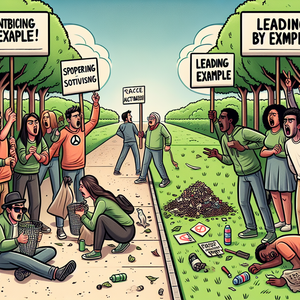The Rise of a Climate Capitalist: Al Gore's Profitable Ventures

Al Gore's initial political career was marked by a deep commitment to environmental issues. His influential documentary, *An Inconvenient Truth*, released in 2006, not only raised widespread awareness about climate change but also marked a pivotal turning point in his career. After the film’s success, Gore embraced a new role as a climate capitalist, leveraging his platform and resources to invest in companies that align with his vision for a sustainable future. In 2004, Gore co-founded Generation Investment Management, a firm that focuses on sustainable investing. This venture was not merely a financial undertaking; it was a testament to his belief that profitability and environmental responsibility can coexist harmoniously. Gore’s approach is centered around the idea that companies dedicated to sustainability will outperform their less responsible counterparts over time. This philosophy has proven prescient as the global economy increasingly shifts toward green technologies. For instance, the rise of renewable energy investments has been exponential in recent years, reflecting a broader societal shift toward sustainability.
Notable Investments and Their Impact
One of the standout successes of Gore's investment strategy is his involvement with companies like Tesla, which has revolutionized the automotive industry with its electric vehicles. By backing innovative technologies that prioritize sustainability, Gore has positioned himself at the forefront of the green revolution. His insights into market trends and the future of energy have allowed him to identify and support companies that promise significant financial returns while contributing to a healthier planet. In addition to Tesla, Gore has invested in companies such as Beyond Meat, which aims to reduce the environmental impact of meat production through plant-based alternatives. This investment reflects a growing consumer demand for sustainable food sources and highlights Gore’s foresight in recognizing market shifts. The plant-based protein market has grown exponentially, driven by increasing concerns over climate change and animal welfare. By supporting such ventures, Gore demonstrates how investments can be both lucrative and responsible, influencing other investors to consider the environmental implications of their portfolios. Moreover, Gore has also invested in renewable energy firms such as SunPower and companies focused on energy efficiency technologies. These investments exemplify his commitment to fostering innovation in the energy sector while addressing the urgent need for sustainable solutions.
The Emergence of Socially Conscious Investment
Gore’s transition into the realm of climate capitalism exemplifies a broader trend where investors are increasingly considering the environmental and social impact of their investments. The rise of Environmental, Social, and Governance (ESG) investing has encouraged a new generation of investors to seek out opportunities that align with their values. This shift highlights a growing recognition that successful investing goes beyond mere financial metrics; it encompasses a holistic view of a company’s impact on society and the environment. Gore’s success serves as an inspiration, proving that it is possible to achieve financial success while championing sustainability. His ventures not only cater to the rising demand for ESG investments but also pave the way for future entrepreneurs and investors who wish to make a positive impact. Research shows that companies with strong ESG practices often outperform their peers, further validating Gore's investment philosophy. Moreover, this shift in investment philosophy signifies a significant cultural change. As more people become aware of the urgent need for climate action and sustainability, there is a growing demand for transparency and accountability in corporate practices. Investors are increasingly recognizing that businesses with robust sustainability strategies are better positioned to manage risks associated with climate change and shifting consumer preferences.
Al Gore’s journey from a political leader to a climate capitalist illustrates the potential for aligning passion with profit. His investments in renewable energy and sustainable technologies highlight a transformative approach to capitalism that prioritizes environmental responsibility. As the world grapples with the challenges posed by climate change, Gore’s example provides valuable lessons on the importance of socially conscious investment. By championing sustainability and supporting innovative companies, he has paved the way for a new breed of investors who recognize that protecting the planet can also yield significant financial rewards. In a time when the stakes have never been higher, Gore’s ventures remind us that a profitable future can indeed be a green one. As society continues to navigate the complexities of climate change, the integration of ethical considerations into investment strategies will likely become the norm, fostering a healthier planet while driving economic growth.
Sustainability Analyst
Deloitte, PwC, NGOs
Core Responsibilities
Conduct research and analysis on sustainability practices within companies to assess their environmental impact.
Develop sustainability reporting frameworks to help organizations communicate their ESG strategies effectively.
Collaborate with cross-functional teams to implement sustainability initiatives and track performance metrics.
Required Skills
Strong analytical skills with proficiency in data analysis tools (e.g., Excel, SQL).
Knowledge of sustainability frameworks such as GRI, SASB, or CDP.
Excellent communication skills for presenting findings to stakeholders.
Renewable Energy Project Manager
SunPower, NextEra Energy, government agencies
Core Responsibilities
Oversee the planning and execution of renewable energy projects, ensuring they meet budget and timeline requirements.
Coordinate with engineers, contractors, and regulatory agencies to facilitate project development and compliance.
Identify potential project risks and develop mitigation strategies.
Required Skills
Strong project management skills, preferably with certification (PMP or similar).
Familiarity with renewable energy technologies such as solar, wind, or bioenergy.
Ability to analyze financial models and feasibility studies related to energy projects.
ESG Investment Analyst
Generation Investment Management, BlackRock, venture capital firms
Core Responsibilities
Analyze potential investment opportunities with a focus on environmental, social, and governance factors.
Develop investment recommendations based on ESG criteria and market trends.
Engage with companies to assess their sustainability practices and impact on long-term financial performance.
Required Skills
Strong financial analysis skills with familiarity in portfolio management.
In-depth understanding of ESG metrics and investment principles.
Excellent verbal and written communication skills for reporting findings to investment teams.
Corporate Social Responsibility (CSR) Manager
Large corporations in consumer goods, technology, and energy sectors
Core Responsibilities
Develop and implement CSR strategies that align with the company's sustainability goals and brand image.
Monitor and report on CSR initiatives, measuring their impact on both the community and the business.
Foster relationships with stakeholders, including community organizations and environmental groups.
Required Skills
Strong organizational and leadership skills to manage cross-departmental initiatives.
Excellent interpersonal skills for stakeholder engagement and communication.
Knowledge of sustainability reporting standards and frameworks.
Sustainable Product Development Specialist
Unilever, Procter & Gamble, sustainable startups
Core Responsibilities
Lead the development of new products with a focus on sustainability and minimal environmental impact.
Collaborate with marketing, engineering, and supply chain teams to ensure sustainable practices are integrated throughout the product lifecycle.
Conduct lifecycle assessments to evaluate the environmental impact of products from sourcing to disposal.
Required Skills
Strong background in product design and development, preferably in sustainable materials.
Familiarity with lifecycle assessment tools and sustainable design principles.
Creative problem-solving skills to innovate environmentally friendly solutions.


